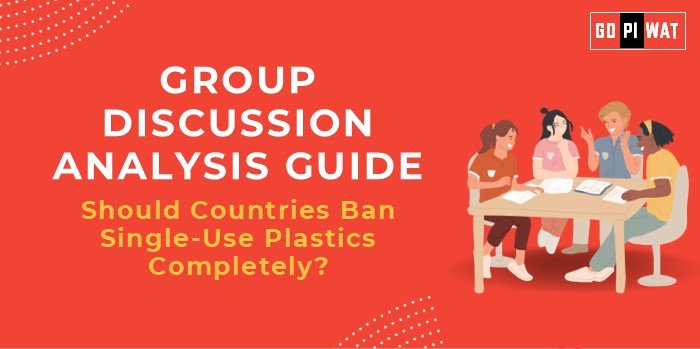🌍 Group Discussion (GD) Analysis Guide
📋 Topic: Should Countries Ban Single-Use Plastics Completely?
🌟 Introduction to the Topic
Opening Context: The global fight against plastic pollution has intensified, with single-use plastics at the forefront due to their significant environmental and ecological impact. Countries like Rwanda have implemented comprehensive bans, setting a precedent for global discussions.
Topic Background: Single-use plastics, designed for short-term utility, contribute disproportionately to pollution, with approximately 8 million tons entering oceans annually. Despite recycling initiatives, only 9% of all plastics produced are recycled globally.
📊 Quick Facts and Key Statistics
- Annual Plastic Waste: Over 300 million tons produced worldwide, half of which are single-use.
- Marine Impact: Plastic constitutes 80% of marine debris.
- Decomposition Time: Plastic bags can take 10-20 years, and bottles up to 450 years to degrade.
- National Examples: Rwanda banned single-use plastics in 2008, achieving a 95% compliance rate in urban areas.
- Global Agreements: Over 170 countries pledged to reduce plastic pollution at the 2022 UNEA conference.
🤝 Stakeholders and Their Roles
- Governments: Enact legislation, enforce bans, and promote sustainable alternatives.
- Private Sector: Innovate biodegradable materials and adopt eco-friendly practices.
- Consumers: Shift to reusable alternatives and support eco-friendly brands.
- International Organizations: Provide frameworks, like the UNEP’s global plastics treaty.
✔️ Achievements and Challenges
🌟 Achievements:
- Reduction in waste: Countries with bans (e.g., Kenya) report significant waste management improvements.
- Awareness Growth: Public campaigns increased sustainable practices globally.
- Technological Advancements: Innovations like bioplastics and edible packaging are gaining traction.
⚠️ Challenges:
- Economic Resistance: Industries face high costs for sustainable alternatives.
- Recycling Limitations: Inefficient systems hinder effective recycling.
- Socioeconomic Inequality: Developing countries struggle with the cost of alternatives.
🌐 Global Comparisons:
- Success: Rwanda’s enforcement model inspires other nations.
- Challenges: The U.S. faces resistance due to decentralized policies and industrial lobbying.
📖 Structured Arguments for Discussion
- Supporting Stance: “A complete ban on single-use plastics is necessary to curb marine pollution and promote sustainability.”
- Opposing Stance: “Such bans may cripple small businesses reliant on affordable plastic products.”
- Balanced Perspective: “While a ban is crucial, it should be gradual and supported by scalable alternatives.”
🚀 Effective Discussion Approaches
- Opening Approaches:
- Data Highlight: “With over 8 million tons of plastic entering oceans annually, marine ecosystems face unprecedented threats.”
- Ethical Angle: “Do we prioritize convenience today at the cost of tomorrow’s livability?”
- Counter-Argument Handling:
- Example: “While critics argue cost, the long-term savings from reduced environmental damage outweigh short-term financial burdens.”
🔍 Strategic Analysis of Strengths and Weaknesses
- Strengths: Global focus on sustainability, emerging alternatives.
- Weaknesses: Limited accessibility to alternatives, resistance from industries.
- Opportunities: Innovating bioplastics, public-private collaborations.
- Threats: Lobbying by plastic manufacturers, lack of global enforcement mechanisms.
🎓 Connecting with B-School Applications
- Real-World Applications: Link to projects on environmental sustainability, operational efficiency with alternatives, and policy impact analysis.
- Sample Interview Questions:
- “How would you balance economic growth and environmental sustainability?”
- “What role can businesses play in eliminating single-use plastics?”
- Insights for Students:
- Focus on case studies of successful bans.
- Study the economic impact of transitioning to alternatives.


